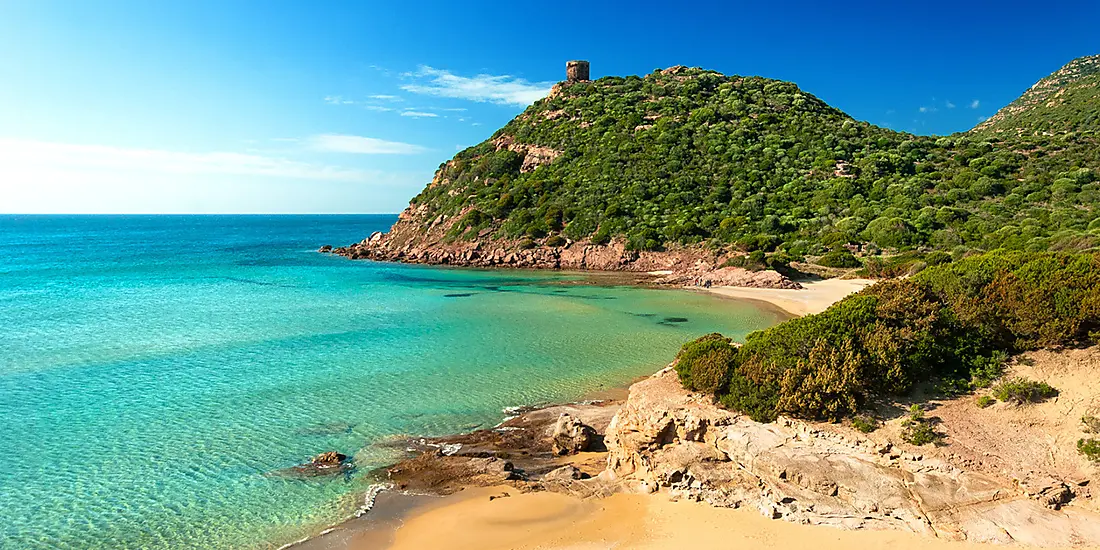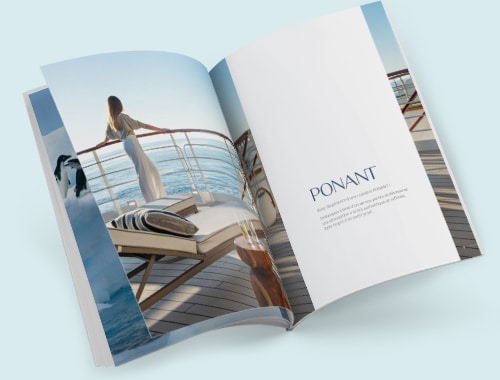Must-Sees - Spain
Too often, we associate Spain with the Mediterranean and forget the towns and cities on the Atlantic side of the country. However, these are actually brimming with internationally renowned treasures. Below, we give you five things to do to improve your understanding of this "Atlantic Spain".
Read more
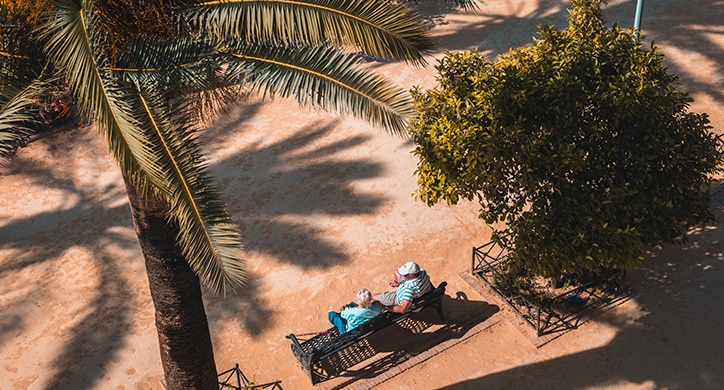
The Essentials - Spain
The Atlantic coast and Spanish Basque Country offer travellers a warm welcome. Learn more about this part of Spain set between the Mediterranean, Africa and the Atlantic and its convivial gastronomy, lovely towns and cities, and enticing culture.
Read more
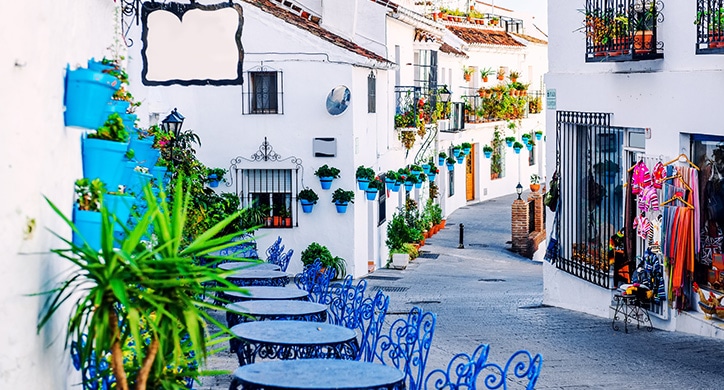
Explore Spain
Must-Sees - Spain
Too often, we associate Spain with the Mediterranean and forget the towns and cities on the Atlantic side of the country. However, these are actually brimming with internationally renowned treasures. Below, we give you five things to do to improve your understanding of this "Atlantic Spain".
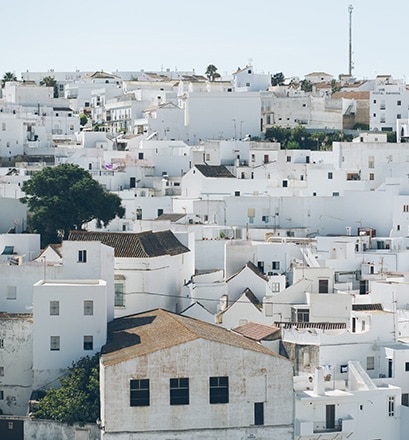
Explore Vejer de la Frontera
Some say it's one of the most beautiful villages in Spain. Made a site of historic interest in 1976, Vejer de la Frontera is perched 200 metres up on a hillside. Its houses press together, pots of geraniums decorate balconies, roses stand out against white walls, alleys turn into winding staircases to create a maze in which it's fun to get lost, tiled fountains and squares, Divino Salvador: the parish church, the remains of a medieval fortress, laundry drying on roofs, patios... Vejer de la Frontera has a Mediterranean feel halfway between those of Spain and Morocco. This is a peaceful oasis.
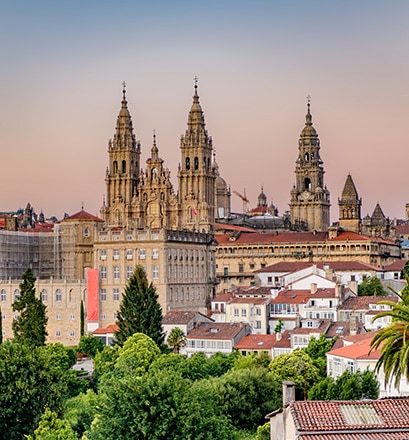
Be a pilgrim in Santiago de Compostela
Tucked away at the end of a bay in the north-west of Spain, the town of Cée is a calm place. People enjoy walking along the promenade and through the shady streets. Cée is also one of the starting points for journeys to Santiago de Compostela. Some people choose to walk to Santiago via the Way, while others go straight to the city, which is the third biggest pilgrimage site in the Christian world. All the landmarks represent the fate of this city inextricably linked to faith: Praza do Obradoiro, St Jerome's Palace (the Pazo), Catholic Kings' Hospital now transformed into a luxury hotel, the Portico of Glory, the Cathedral and the Tomb of St James.
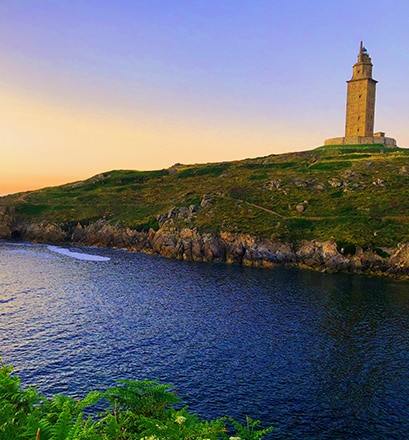
Admire an ancient wonder
While A Coruña attracts tourists looking to enjoy some sun and its huge sandy beach, it is also famous for its Roman lighthouse. A UNESCO World Heritage Site since 2009, the Tower of Hercules has been welcoming ships coming into the city port since about 100 AD. This lovely site is on a headland facing the Atlantic Ocean and also contains several statues, a Muslim cemetery and Iron-Age petroglyphs.
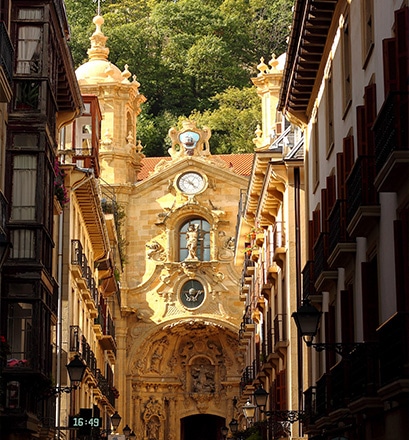
Enjoy a day in San Sebastián
Near the border between France and the Spanish Basque Country lies San Sebastián. Tucked away in a charming bay, this seaside resort where the royals used to holiday has a fantastic sandy beach: the ideal place to stop and cool off before heading into the old town. The city contains the lovely gothic-style Saint Vincent's Church built in the 16th century, the Basilica of Saint Mary of Coro and Constitution Square. The numbers on the windows of the buildings around the square are a reminder that it used to be a bullfighting arena. When the narrow alleys become more lively following the afternoon siesta, it's nice to wander them in search of authentic tapas bars and designer boutiques.
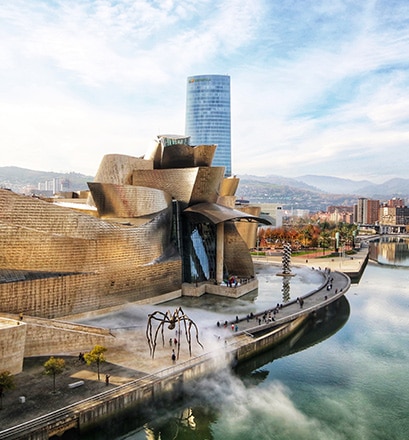
Visit the Guggenheim Museum in Bilbao
It dominates Bilbao's river. Its imposing titanium, granite and glass structure is reflected in the water running right through the city. Designed by the architect Frank Gehry, its very structure is inspiring. Then there are the Bilbao Guggenheim Museum's 11,000 square metres of rooms. Permanent and temporary exhibitions showcase the work of famous 20th-century artists. This is a fabulous example of harmony and dialogue between a place and the works it contains, delighting contemporary art lovers.
The Essentials - Spain
The Atlantic coast and Spanish Basque Country offer travellers a warm welcome. Learn more about this part of Spain set between the Mediterranean, Africa and the Atlantic and its convivial gastronomy, lovely towns and cities, and enticing culture.

Top tips
Dos. The Spanish are happy to use informal language right from the off. Using the formal you (usted) can be perceived as insulting. It is also normal to kiss as a greeting, even if you do not know each other.
Don'ts. Spanish people like to dress to impress, especially during their pre-dinner walk, known as the paseo. Sloppy outfits are a no-go.

Essential phrases
Hello/Good evening: Buenos días/Buenas tardes
Goodbye: Adiós
Welcome: Bienvenido
Excuse me/Please: Por favor
Thank you: Gracias
Yes/No: Sí/No
How are you?: ¿Cómo estás?
Very well, thanks, and you?: Muy bien, gracias, ¿y usted?
My name is...: Me llamo…

Gastronomy
The people of the Spanish Basque Country know just how to enjoy their food. Txikiteo means going to bars with friends and having a cold beer or glass of wine and some pintxos: tasty tapas made from Iberian cooked meats, cheese, anchovies and squid.

In the spotlight
The documentary The Silence of Others (directed by Robert Bahar and Almudena Carracedo, released in February 2019) gives a voice to the victims of the Franco dictatorship, calling the infamous "Pact of Forgetting" into question. Passed in 1977, two years after Franco's death, this amnesty law plunged Spain into a sort of "amnesia" according to victims of the dictatorship. However, many citizens have condemned this practice in recent years, even turning to the Argentine justice system.

Culture
Books. With over 600,000 copies sold in Spain, Homeland (published in 2018) by the Basque author Fernando Aramburu has been called the Basque Country version of War and Peace by some newspapers. It all begins when elderly Bittori visits her husband's grave to tell him that ETA is giving up its weapons and she is going back to the village. In this same village, she will come into contact with activists who may have her husband's blood on their hands, members of this family destroyed by years of post-Francoism and armed conflict.
Music. Music is a key part of Basque culture. Linked to oral tradition, it notably recounts the adventures of fishermen who left for long months at sea. These songs are accompanied by traditional instruments like the accordion and Basque tambourine.
Film. No discussion of Spanish cinema is complete without mentioning Pedro Almodóvar. The filmmaker presented his most recent film, Pain and Glory, at Cannes in May 2019. This semi-autobiographical work is a poignant addition to Almodóvar's extensive filmography, including High Heels, All About My Mother, Volver and Talk to Her, all set against a distinctly Spanish backdrop.
Facts and figures
3 100Archaeological remains dating from over 3,100 years ago have been discovered in Cádiz, southern Spain. This evidence of human and trade activity makes the city one of Europe's oldest.









